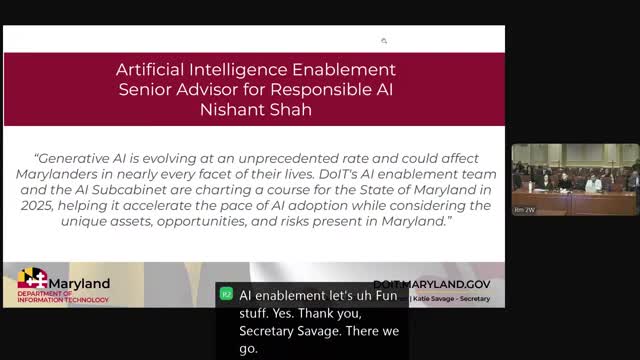DoIT outlines AI strategy, publishes inventory and hires AI enablement team; Gartner 311 study due in February
Get AI-powered insights, summaries, and transcripts
Subscribe
Summary
Nishant Shah, DoIT's lead for AI enablement, told the Education, Energy, and the Environment Committee that the department completed an initial AI inventory, finalized a state AI strategy under SB 818, established an AI enablement team and contracted Gartner to study AI use for 311, with recommendations due Feb. 15.
Nishant Shah, DoIT’s lead for AI enablement, briefed the Education, Energy, and the Environment Committee on Maryland’s new AI workstream, describing a strategy that combines governance, data readiness and scaled experimentation.
"We collected the state's first AI inventory detailing all live AI use cases, and we're in the midst of looking through these now to ... before publishing them, again, as required by SB 818," Shah said. He told senators the inventory catalogs live AI use cases across state agencies, but the department has not yet completed risk classification for each use case; DoIT plans to publish classification policy in the coming weeks and apply it retroactively to the inventory.
Key deliverables and programs Shah described include an AI strategy produced by the AI subcabinet, required by SB 818; free asynchronous AI training delivered via a partnership with Innovate US for state employees; and hiring the first members of an internal AI enablement team to serve as a center of excellence and an incubation shop for agency pilots.
DoIT told the committee it has also launched targeted proofs‑of‑concept — examples cited include document processing, natural language analysis and permitting application verification — and will use both bottom‑up experimentation and structured beachhead projects to move promising pilots toward production.
On 311, Shah said DoIT commissioned Gartner to study the feasibility of leveraging AI for 311 services and centralization. "Gartner has interviewed 15 different folks, including yourself, senator, and are due to provide an update by February 15th," he said; the study will examine use cases, centralization feasibility and hybrid approaches.
Committee members asked whether the inventory currently includes any consequential or rights‑impacting systems (for example, systems that affect benefits, licensing or public safety). Shah said the inventory is still being risk‑classified and that DoIT will publish a policy for classification soon and then apply it to existing entries.
Why it matters: The AI inventory and the subcabinet strategy provide a baseline for responsible use and agency oversight required by SB 818, while the AI enablement team and training aim to increase the state workforce’s AI literacy. The Gartner 311 study may shape whether local governments or counties use centralized or hybrid models for citizen service requests.
Ending: DoIT expects to release classification policy in the coming weeks, complete the Gartner 311 feasibility report by Feb. 15 and to publish an updated AI inventory after agencies review and validation.
